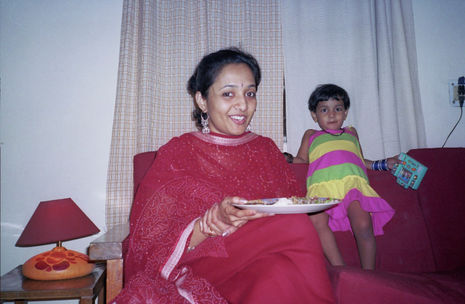Where mother ends, daughter begins: what my relationship with my mother taught me about being a woman
They can be our closest relationships, but also the most fraught. Nayantara Nair argues that despite society’s willingness to pitch women against each other, she refuses to see her mother as a rival

As I sit here, trying to find the words that best encapsulate the complexity of the relationship between my mother and I, I look up and see her laughing with her mother in law - my grandmother. We’re sitting in one of the bedrooms in my grandmother’s flat: my sister, mother and I on the bed and my grandmother is lounging in the rocking chair in front. They’re watching an Indian soap, my sister and I are on our phones.
There are old pictures of family pasted all along the walls. Mostly of my father and his sister, particularly of when they were younger. I look at the photos of my aunt, and then look back to my mother. One is a daughter by blood, the other by marriage. I wonder, how is it that my mother can laugh so heartily with a mother that is not her own? In many ways, the boundaries forged by blood appear blurred. When I see my mother, aunt and grandmother together I see them as a mother with her daughters. The familial proximity between my paternal grandmother and aunt is one that extends to my mother without difficulty. Amidst a swathe of tense relations between women and mothers in law, the relationships that I observe within my own family lack the generational rivalry and competition that is often noted among women placed together in a society that encourages the belief that only one can prevail. That only one can survive.
“In the case of mother and daughter, it is a case of both love and subconscious envy combined”
Indeed, a rivalry between women is often fostered by social circumstances. It is a socialised tragedy that has been embedded in many, though not all, female relationships. In the case of mother and daughter, it is a case of both love and subconscious envy combined.
My mother is a lawyer. She graduated from a state college in Kerala, and worked there for four years before relocating to England with my father. And, in perhaps a generational reiteration, I started studying Law at Cambridge just two years ago. Such similarity does invite a degree of comparison, though this comparison was not initially vocally entertained by either of us. Yet, perhaps predictably, the inevitability of such a comparison overcame us both.
The enormity of what a place to study Law at Cambridge embodied allowed certain tensions to settle. In many ways, I saw tense conversations with my mother serve as a way for her to maintain balance. A way of preserving the traditional parent-child hierarchy, where parent is always top. If I really think about it, I believe that my mother had begun making the comparison between us much before I did.
Women have constantly been subject to a blind commodification which furthers the belief that generations of women cannot coexist. That women begin to decay after they turn thirty, and must take up less space to provide more room for the new wave of younger, more beautiful and valuable women.
This dynamic frustrates the relationship between mother and daughter. Whilst the love is there, the hurt that comes from seeing your daughter flourish and being welcomed into a society that now turns you away is one that many women experience at a certain point in motherhood.
“To her, I am a manifestation of a ticking clock that has been imposed on her by society. Yet, I come in the form of someone who she loves”
So, it makes sense that this is something that played on my mother’s mind before it did on my own. To her, I am a manifestation of a ticking clock that has been imposed on her by society. Yet, I come in the form of someone who she loves. Someone who she has nurtured for nearly two decades.
Yet this conflict is orchestrated entirely by society’s centering of male values. Indeed, I see my mother as a woman who has built a career for herself in a country which was not initially her own. In the midst of career breaks, from both child rearing and ill health, my mother has cultivated a prominent place in the legal field. How could I ever ignore that? Why would I ever try to? This competition between mother and daughter is arbitrary, based on fallacious notions of female rivalry that do not spare even mother and child.
In many ways, I am free of the particular constraints that have held my mother back. In the same way that she was free of the many constraints that held back her own mother. And whilst we look on to the next generation with love, it is natural that there is perhaps a fleeting envy of the opportunities that were lacked, now openly given. Thus, in a world where women have been socialised to view each other’s successes as their own downfall, it is arguably understandable that the relationship between mothers and daughters becomes another casualty.
Yet motherly love prevails.
And so, I finish writing this as I started. Another day, with my mother and grandmother again. It’s not an Indian soap this time, but a music channel showcasing the ‘best of Bollywood’. The fan is whirring as it was before, and their laughs echo once again. I look at the pictures on the wall and then I look at them. Relationships between mother and daughter, in all their complexity, possess a beauty so rare that it can embody both generational hopes and generational successes. What is mine is also theirs.
What is mine, is hers.
 News / Cambridge students set up encampment calling for Israel divestment6 May 2024
News / Cambridge students set up encampment calling for Israel divestment6 May 2024 News / Cambridge postgrad re-elected as City councillor4 May 2024
News / Cambridge postgrad re-elected as City councillor4 May 2024 News / Some supervisors’ effective pay rate £3 below living wage, new report finds5 May 2024
News / Some supervisors’ effective pay rate £3 below living wage, new report finds5 May 2024 Fashion / Class and closeted identities: how do fits fit into our cultures?6 May 2024
Fashion / Class and closeted identities: how do fits fit into our cultures?6 May 2024 News / Academics call for Cambridge to drop investigation into ‘race realist’ fellow2 May 2024
News / Academics call for Cambridge to drop investigation into ‘race realist’ fellow2 May 2024






